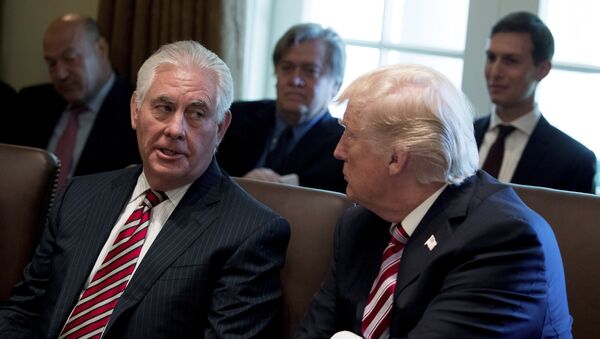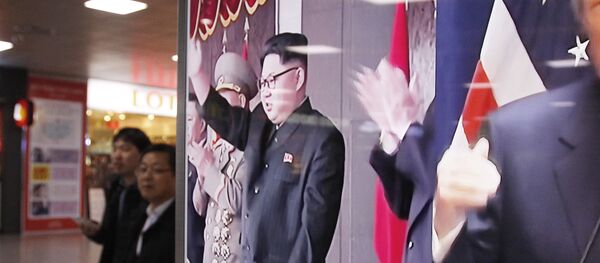During a Wednesday press briefing, US Department of State spokesperson Heather Nauert told reporters: "All of what the Secretary has said, and the administration has said in the past is that we are willing to sit down and have conversations with them, but now is not the right time. The Secretary was not creating any new policy. Our policy remains exactly the same as it was."
On Radio Sputnik's Loud and Clear, Jude Woodward, author of the recently-released book "The US vs China: Asia's New Cold War?" explains how the US shift in North Korean rhetoric portrays the instability of US foreign policy.
In her conversation with hosts Brian Becker and John Kiriakou, Woodward pointed out that US President Donald Trump has repeatedly expressed skepticism over negotiating with North Korea.
"This is not the first or second time that the Secretary of State has come out and said something on North Korea, something quite important, and then the president jumps in, usually by tweet, and says, ‘We will do no such thing.' It's embarrassing. It demeans us in front of our foreign partners and frankly I think it makes us a weaker country," Kiriakou said.
Woodward, an expert on China, agreed with former CIA agent Kiriakou, saying, "I do not know exactly what they are saying in China, but I think what's clear is that you have a revolving door in the White House and that there are differences and Trump has been unable to build a stable foreign policy with people being shifted around from one position to the other. I think that this is not the first time that Tillerson has said he thinks tasks are necessary with North Korea. [former White House Chief Strategist] Steve Bannon has also said that he thinks there is no military solution with North Korea and talks have to happen," Woodward explained.
"This is just a crisis in the foreign policy of the US presidency. It's hard to say what foreign US policy is in many respects in the moment," she added.
Meanwhile, developments in China-South Korea relations are also dictated by the reality of the North Korean question.
Keith Bennett, a China expert, discussed with Loud and Clear the arrival of South Korean President Moon Jae-in in Beijing on Wednesday on a mission to deepen economic relations between the two countries after relations turned sour last year over Seoul's use of the controversial Terminal High Altitude Area Defense (THAAD) system.
"Over the past 25 years, South Korea-China relations have achieved extraordinary development in the economic sector, but their relations in the political and security sectors fell short of such development," Moon said, Korean news agency Yonhap reported. "I will work to develop South Korea-China relations in all other areas to put them on a par with the development in the economic sector, so the South Korea-China relations will not falter due to external factors."
"A month ago they agreed to try to move forward but the THAAD issue is perceived by China as a threat to their own security, even more in fact than the threat of North Korea. That issue has not gone away. They have agreed to try to move beyond it, but since then there's been a certain hardening of the Chinese position once again to see that this will be carried out indeed, not just in words. What they've expected from South Korea is that Moon would not further extend the THAAD system, that South Korea would not join in any regional anti-missile defence system, and that there will be no tripartite military alliance between the US, South Korea and Japan," Bennett explained.





